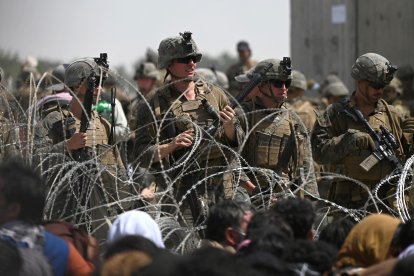The Biden-Harris withdrawal from Afghanistan: chaos, death and a humiliated U.S.
Chaos at Kabul airport, an attack that claimed the lives of Americans and Afghans and which still affects the survivors to this day, US weapons under Taliban control, and Islamist oppression that targets women especially. This is what the catastrophic operation led by the Biden-Harris Administration left behind three years ago.

U.S. soldiers at Kabul airport during the withdrawal from Afghanistan
This Friday marked three years since the catastrophic withdrawal of US forces from Afghanistan, nearly 20 years after the invasion carried out by the United States following the September 11 attacks.
The Taliban's rapid control of Kabul, Afghanistan's capital, on August 15, 2021 took the Americans by surprise, producing chaos and death. In fact, there was a heavy bombing outside the Kabul airport in which 13 U.S. military personnel and about 170 Afghans were killed.
The fall of the Afghan capital followed the almost unopposed collapse of the pro-Western government and the escape of President Ashraf Ghani, and was the end point of a whirlwind campaign in which radical Islamists seized control of all the country's major cities in just a week, resulting in chaos to evacuate desperate Afghans and foreigners who did not want to remain under Taliban rule and were crowding outside Kabul airport. Some locals even hung from rescue planes to escape the coming oppression and several parents preferred to hand over their children to the U.S. military to be taken out of the country.
Para los que se la pasan diciendo que Estados Unidos es el villano y que solo invade países, y que se creen la policía del mundo…
— Javierhalamadrid (@Javierito321) August 16, 2021
Bueno aquí tienen el avión militar de USA retirándose de Afganistan y como la gente muere buscando libertad, ya que los terroristas tomaron el país. pic.twitter.com/TnJ0DwuGJE
The shocking images received widespread coverage around the world and gave the impression that the United States was fleeing Afghanistan.
The events demonstrated a clear failure of U.S. intelligence regarding the survival of the Afghan government and not only damaged the image of the United States, but especially that of the Biden-Harris Administration.
Another humiliation for the Biden-Harris Administration from the Taliban: U.S. weapons in the hands of Afghan terrorists
In April 2022, a U.S. Department of Defense report accessed by CNN noted that U.S. forces left military equipment valued at $7 billion in Afghanistan during the chaotic 2021 withdrawal.
These were weapons that had been sent to the previous government for 16 years and were left in the hands of the Taliban, who even exhibited some of the equipment to humiliate the United States at a recent military parade held to celebrate their three years in power.
The equipment abandoned in Afghanistan includes air-to-ground weaponry, military vehicles, weapons, communications equipment, among others, the report stressed.
Was the withdrawal from Afghanistan a good idea?
While the withdrawal from Afghanistan has been widely criticized for the death and grief caused by its sloppiness and improvisation, it is worth asking whether the operation, first pushed by President Donald Trump when he signed an agreement with the Taliban, was a good idea, beyond the controversial implementation by the Biden-Harris Administration.
A 2022 study by the Institute for National Security Studies (INSS), an organization affiliated with Tel Aviv University and made up of a group of Israeli experts, argued that the decision to withdraw the country's military presence was shared by Trump and Biden, despite their notable differences, and both believed that the advantages would outweigh the disadvantages.
In practice, the INSS continued, counterterrorism, which had been the cornerstone of U.S. policy, moved to the back of the agenda due to the decline in international terrorist activity and the need to address global challenges that pose a greater threat to U.S. security.
From an international counterterrorism perspective, there is no indication that Al-Qaeda intends to re-establish Afghanistan as a global training ground for terrorists of different nationalities, as it did in the past, to prepare them to carry out terrorist attacks in the West.
Moreover, it does not appear that the Taliban themselves will allow al-Qaeda to resume its activities on Afghan soil as in the past. Among the Taliban, which is not a monolithic group, there are those who oppose this. Many of the organization's current commanders recall the heavy price the United States charged their former regime for allowing Al-Qaeda to operate under its protection and use the country's territory not only as a training base for terrorism, but also as a platform for carrying out attacks against the United States and its allies.
One could cautiously predict that al-Qaeda, in its current situation of capabilities and operational infrastructures abroad, cannot again conduct extensive terrorist campaigns as it attempted to do in the past. However, despite the difficulties, the organization has not disappeared and continues to operate, thus requiring close intelligence monitoring to minimize the risk of surprises. In addition, it should be noted that ISIS-K (Islamic States of Greater Khorasan) continues to remain active in Afghanistan.
In the face of this potential threat of a resurgence of international terrorism, Biden pledged that the United States will continue to maintain its ability to thwart attacks when they are in their early stages, based on remote intelligence gathering using advanced technology and with the cooperation of regional allies. However, the INSS cautioned that without a physical presence in Afghanistan and diplomatic representation, it will be more difficult for U.S. administrations to fulfill these commitments.
Effects of the Kabul bombing still affect survivors
Three years after the bombing that killed 13 U.S. servicemen and about 170 Afghans outside Kabul airport during the chaotic U.S. withdrawal from Afghanistan, survivors are still suffering the psychological and physical effects of the attack.
On Aug. 26, 2021, Shafiullah Samsor, a 22-year-old English literature student, was among thousands of desperate Afghans outside Kabul airport waiting to be evacuated by U.S. forces to flee the Taliban.
Amid the chaos, a suicide bomber blew himself up in the crowd and another explosion followed, causing death and horror all around him. The attack, one of the deadliest of the war in Afghanistan, was claimed by the Islamist group ISIS-K and became one of the symbols of the catastrophic U.S. withdrawal.
In recent statements to Radio Free Europe/Radio Liberty, the young man commented that suddenly there was a loud explosion that threw him to the ground, he heard screams and saw people running in all directions. "I remember the blood and dust around me before I fell unconscious," he said.
Samsor has been unable to return to college, is unable to work and can barely walk with the help of crutches. He, his five sisters and his mother survive on money sent by his brother, who works in Iran.
His family's severe financial problems began after the attack, as they had to use all their savings and sell a plot of land and a car to finance Shafiullah's complex and lengthy treatment.
"I hope that Allah will punish those responsible for devastating my life and the lives of so many others," the young man stated.
Another heartbreaking story published by Radio Free Europe/Radio Liberty is that of Meisam Ahmadi. She lost her two brothers in the bombing, journalist Alireza Ahmadi and photojournalist Mujtaba Ahmadi, who were at the scene when a friend of theirs had told them that U.S. forces had allowed him to enter the airport and had promised to help them get in.
"Unfortunately, there was an explosion there, and both of them were standing together, and they lost their lives," Meisam said.
New evidence about the bombing
CNN revealed new evidence in April about the suicide bombing that contradicts two investigations conducted by the Pentagon.
The U.S. Army has maintained for two years that the deaths were caused by an explosion and that troops who reported being shot and responding to the attack were likely confused by the effects of the shock of the blast.
However, according to new evidence, provided in part by footage captured by a Marine's body-camera, there was significantly more gunfire than the Pentagon had indicated.
CNN, which spoke with several military personnel on the scene, quoted a soldier who said he heard the first burst of gunfire coming from the scene of the explosion. And he stressed that it was not sporadic gunfire, but a massive amount of gunfire.
In addition, an Afghan doctor making public statements for the first time told CNN that dozens of his compatriots died from gunshot wounds.
Trump's harsh criticism
While Donald Trump's administration signed the withdrawal agreement with the Taliban in February 2020 and the Biden-Harris administration implemented it, the former president has been highly critical of the manner in which the operation was carried out.
Since the disastrous withdrawal, Trump has been vocal in his criticism of Biden. And recently, the Republican presidential candidate stated on Truth Social that the operation was "botched" and "the most EMBARRASSING moment in the history of our Country." He added: "You don’t take our soldiers out first, you take them out LAST, when all else is successfully done."
"Russia then invaded Ukraine, Israel was attacked, and the USA became, and is, a laughing stock all over the World," Trump maintained.
Kamala Harris's responsibility
Trump also took aim at Vice President Kamala Harris for the chaotic U.S. withdrawal from Afghanistan. During a recent speech in North Carolina, he said, "She bragged that she would be the last person in the room, and she was. She was the last person in the room with Biden when the two of them decided to pull the troops out of Afghanistan." He added that "she had the final vote. She had the final say, and she was all for it."
Harris's comments were indeed made during an interview with CNN in which she even said that it was a "courageous" decision.
Tomorrow is the third anniversary of the bombing at Abbey Gate in Kabul, Afghanistan — which took the lives of 13 U.S. service members and injured many more.
— RNC Research (@RNCResearch) August 25, 2024
Here's Kamala in 2021 bragging about being the last person in the room for that decision. pic.twitter.com/2dRog9EBPF
Life under harsh Taliban oppression
The U.S. withdrawal led to the Taliban seizing power again in Afghanistan, resulting in, among other things, the imposition of extreme Islamic laws and a marked deterioration in the rights of Afghans, especially women. In addition, the country is facing a severe economic and humanitarian crisis.
Recently, the Taliban government has issued a series of laws in order to further curtail the freedoms of its citizens, including a ban on the sound of women's voices in public.
The document, accessed by The Associated Press, is the first declaration of laws on virtue and vice issued by the Taliban since they assumed power in Afghanistan in 2021 following the chaotic U.S. withdrawal from the country.
It should be noted that in the same year the Taliban created the Ministry for Propagation of Virtue and Prevention of Vice, which is in charge of regulating these measures.
Among the new rules, which were issued after being approved by Supreme Leader Hibatullah Akhundzada, it is also noted that women must cover their bodies in public spaces, mainly their faces, to avoid tempting themselves and others. They must also cover themselves in front of non-Muslim men and women so as not to corrupt themselves.
In addition, laws issued by the Islamic fundamentalist regime indicate that women must wear clothing that is neither tight-fitting nor short.
The rules even impose hard restrictions on the sounds emitted by a woman, as it considers her voice to be intimate, so it is forbidden to listen to her singing, reading or reciting in public.
Women and men are also prohibited from looking at persons of the opposite sex with whom they do not have a blood or marital tie.
Other prohibitions issued by the Taliban include broadcasting images of living beings and playing music.
Regarding public transportation, the new rules prohibit drivers from transporting adult women without a legal male guardian and oblige passengers and drivers to perform prayers at designated times.
While most of the bans on women or those related to clothing have already been in place in the country since 2021, these laws require uniformity and strict punishment to ensure compliance.
The Taliban pointed out that the laws are formulated based on Sharia law (Islamic legal system) and the Hanafi school, which follows the strictest interpretations of Islamic law.
In addition to Taliban oppression, the inhabitants of Afghanistan suffer from extreme poverty. According to international humanitarian organizations, some 24,000,000 Afghans live at or below the poverty line. Also, unemployment has reached extremely high levels.
RECOMMENDATION





















